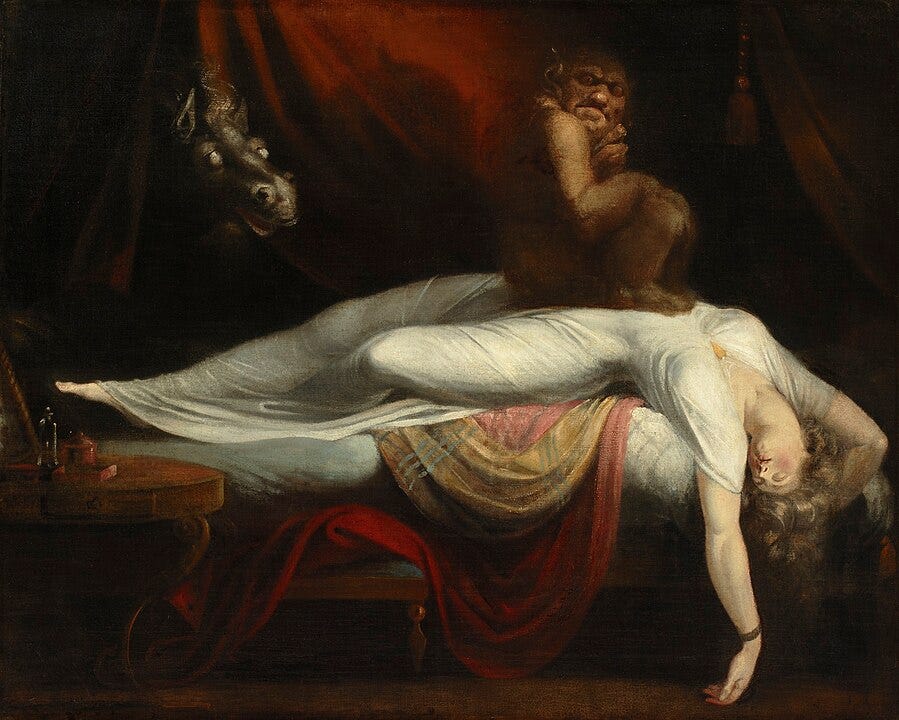Book Review: Dinner with Joseph Johnson by Daisy Hay
Something I wrote for the Samuel Johnson Society (Lichfield)
This piece appeared in The Johnson Society Transactions (2023). If you’re interested in the work of Samuel Johnson (wherever you are in the world) you can join the Society here »

The figure at the heart of Daisy Hay’s kaleidoscopic book about late 18th-century Britain is Joseph Johnson: a bookseller who made his name publishing the works of radical thinkers such as Anna Aitkin (later Barbauld), Mary Wollstonecraft, William Godwin, William Cowper and Joseph Priestley.
The book opens with a peek into Johnson’s strangely shaped dining room in his premises in St Paul’s Churchyard, London. Here, once a week, Johnson, ‘a small bewigged man, with dark eyes’ gave regular dinners to his circle of friends and clients, and here the conversation ranged over such topics as freedom, politics, religion, art and science.
The dinners were not, Hay points out, particularly lavish affairs (roasted veal, boiled fish, boiled vegetables and rice pudding) but they drew some of the brightest minds, many of whom shared Johnson’s Dissenting religious beliefs. Some were struggling artists whom Johnson encouraged and supported; one artist, Henry Fuseli, was a regular guest who would become a lifelong friend of Johnson’s. His painting, The Nightmare, hung above the company while they ate and talked.
Hay, who is an Associate Professor of English Literature and Life Writing at the University of Exeter, is the author of several acclaimed biographies: Young Romantics: The Shelleys, Byron and Other Tangled Lives (2010) and Mr and Mrs Disraeli: A Strange Romance (2015). She brings tremendous verve to this group biography, using Johnson’s dinners as a still point in a turning world. It’s a clever way to organise her epic narrative, which takes in the American War of Independence and the French Revolution, and, despite the huge canvas, her prose never feels laboured.
One moment we hear the voice of Joseph Priestley and witness the devastating effects of the 1791 Birmingham Riots on his family, at another we learn about Erasmus Darwin’s epic poem, The Botanic Garden (1789). Not only did Johnson publish Darwin’s work he commissioned original illustrations from both Fuseli and William Blake. ‘As the London bookseller of both Darwin and Priestley, Johnson became the principal means through which the industrialists of Birmingham and the West Midlands… sought to disseminate their work,’ Hay shrewdly observes.
She is particularly good on William Cowper – a troubled individual whose suicidal depression was averted by the discovery of his own writing talent. His encounters with Johnson (always by letter, since Cowper refused to visit London), and with Fuseli, who became Cowper’s editor, are touching and realistically drawn.
The book is less effective where Hay makes us look through an ideological lens at this group of radical thinkers. She wants Johnson and his friends to be the Good Guys, but the facts occasionally get in the way. Why, she puzzles, would Johnson publish a book that supported the slave trade, while also publishing one that criticised it? The answer is surely that he was a consummate businessman, printing what he knew would sell. But this is not aligned with her idea of Johnson or his circle, whom she characterises – anachronistically – as social justice warriors.
In truth, many of Hay’s subjects were not uneducated or poverty-stricken, but members of an intellectual elite. This is most apparent is the sorry tale of the Birmingham riots themselves. While Priestley was then a supporter of the French Revolution, Hay reserves her horror for an authentic expression of working-class protest, which resulted in the destruction of Priestley’s work and home, and his family’s emigration to the United States of America. Although these riots were indeed shocking, her bias towards the religious Dissenters doesn’t help us to understand the complexities of the situation and its manifold causes.
Another problem is the shadowiness of Johnson himself, whose presence at the heart of the book is slight compared to the giants that surround him. And there are a few moments where Hay’s lively prose lapses into academic-speak (‘The gift marks the first documented instance of Johnson offering a vulnerable ally physical security in exchange for creative labour’). But for the most part, the stories barrel along, overlapping with one another with seeming ease. Hay makes you happy and sad, she entertains you and she occasionally makes your jaw drop, such as when Mary Wollstonecraft asks Fuseli’s long-suffering wife if she would allow her to join their marriage as a third party (the answer was no).
In the Afterword, Hay calls this the most personal book she has written, a fact that (in my opinion) accounts for both its strengths and its weaknesses. Yet Dinner with Joseph Johnson is an impressive achievement. This readable history of Britain, taking in the political, cultural and scientific preoccupations of the late 18th century, is not a boiled-fish-and-vegetables kind of a book; it’s a full-on banquet.






A review that hove up over the horizon of this, still morning, Sunday which I have enjoyed reading and learned from reading in equal measure.
That the author should exhibit a weakness for lapsing, one senses despite her best intentions, into 'academic-speak' in the later stage of the book brought a wry smile to my face. 'Academic-speak' surely is, on occasion, an affliction I agree; just as I know what it is to suffer from a propensity to alliterate. 😂
I've only recently come across The Lichfield Rambler and so far only dipped into a post here and a post there, but here's the thing Annette: doing so has already brought the 18th Century and its Cultural Landscape out of the wings and onto the reader's stage of my imagination.